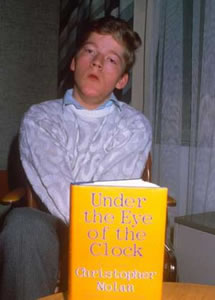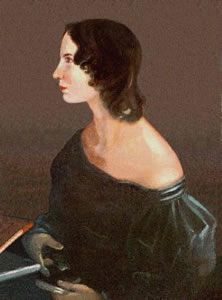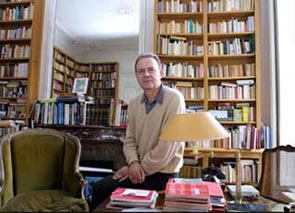De Franse schrijver Patrick Modiano werd geboren in Boulogne-Billancourt op 30 juli 1945. Zie ook mijn blog van 30 juli 2007.
Uit: Unbekannte Frauen (Des inconnues, Vertaald door Elisabeth Edl)
„In dem Sommer, als ich sechzehn war, haben wir in einer großen Villa in Talloires gearbeitet. Am Abend bedienten wir bei Tisch, meine Tante und ich. Monsieur und seine Frau empfingen viele Gäste. Nachmittags fuhren sie zum Golfspielen nach Aix-les-Bains.
Die Frau war eine vornehme Blondine. Sie hatten vier Kinder, zwei Töchter in ungefähr meinem Alter, einen neunzehnjährigen Sohn und einen anderen, fünfundzwanzigjährigen, der seinen Militärdienst in Algerien ableistete.
In jenem Sommer war er für einen längeren Urlaub nach Talloires gekommen. Ein Blonder mit einer in die Stirn fallenden Haarsträhne und einem Gesicht, das meine Freundin Sylvie romantisch gefunden hätte. Er setzte oft eine verträumte oder gequälte Miene auf, aber seinen Bruder oder seine Schwestern kommandierte er mit autoritärer Stimme herum, weckte sie früh am Morgen, um mit ihnen Tennis zu spielen oder in den Segelklub nach Les Marquisats zu fahren. Morgens organisierten die beiden Brüder im Park der Villa sogenannte Liegestütz-Wettbewerbe. Es ging darum, wer länger durchhielt, wenn sie, den Körper in horizontaler Lage auf dem Rasen, die Arme anwinkelten und durchstreckten. Ich machte sein Bett und räumte sein Zimmer auf, und ich hatte auf seinem Nachttisch ein Buch bemerkt, an dessen Titel ich mich noch erinnere: Comme le temps passe!
An der Wand neben dem Bett ein großes Photo seiner Mutter, und auf seinem Schreibtisch ein Dolch in einer ledernen Scheide. Ich hatte ihn oft Tennis spielen sehen und jedesmal mit einem
anderen Mädchen. Mir fiel auf, daß er offensichtlich der Liebling seiner Mutter war und daß auch er sehr große Zuneigung für sie empfand.“
Patrick Modiano (Boulogne-Billancourt, 30 juli 1945)
De Amerikaanse schrijfster Cherie Priest werd geboren in Tampa op 30 juli 1975. Zie ook mijn blog van 30 juli 2007.
Uit: Wings to the kingdom
A Dark and Bloody Ground
The first time it happened—the first time anyone admits to it, anyway—was at a Decoration Day picnic being held at the battlefield at Chickamauga, Georgia. Several dozen doddering representatives of the Sons of Confederate Veterans had come together on a fine June afternoon for chicken-salad sandwiches and punch. Some sat in metal folding chairs, with their wives at their elbows, while others shuffled around the buffet table in search of the correct sliced cheese or condiment.
With so many aggravatingly credible witnesses, there was no denying that something strange had happened. People would argue the details for weeks, but this is the version I caught first. I suppose the best thing to do is tell it the local way—which is to say, this is partly how I heard it happened, and partly how I bet it happened.
He was confused to find himself in the woods.
Why would he leave us?
The soldier didn’t remember falling in the trees, and what he did remember of trees came to him in hazy fragments of gold and red—not this dark-shadowed hollow where he first arose.
Above, the canopy was green; and below, the ground was covered with new, sprouting things. Back when last he’d seen it, this had been a field. He was nearly certain of it. This whole place had been made of fields and farms, or then again, maybe it hadn’t. Maybe, if he concentrated, he could capture something else—the pressure of his arm against a tree and a squint that made his forehead ache as he leveled his rifle. How tough it must have been to fire with all those trunks in the way, with all that smoke in his eyes. How difficult to aim with all that noise in the woods around him.
How did he ever send off a single shot?
The harder he thought about it, the farther into the distance the details fled. Holding still meant holding on a few moments more, but all he could keep for sure was a dim memory of sound and smelly haze, and a nagging sense of hunger.”
Cherie Priest (Tampa, 30 juli 1975)
De Mexicaanse dichter, schrijver, vertaler, televisiepresentator en ondernemer Salvador Novo werd geboren op 30 juli 1904 in Mexico City. Zie ook mijn blog van 30 juli 2007.
JIJ, IKZELF, DROOG ALS EEN VERSLAGEN WIND
Jij, ikzelf, droog als een verslagen wind
die slechts voor een ogenblik in zijn armen kon houden het blad
dat hij losrukte van de bomen,
hoe is het mogelijk dat niets je nu kan bewegen,
dat geen regen je kan verpletteren, geen zon je jouw vermoeidheid kan
teruggeven?
Een doelloze transparantie zijn
boven de glasheldere meren van je blik,
oh, storm, oh zondvloed van lang geleden!
Indien ik nu een beeld zoek van jou dat alleen van mij was,
indien in mijn steriele handen de laatste druppel van jouw bloed en
mijn tranen verstikte,
indien vanaf nu de wereld onverschillig is geworden,
en in woestenijen eindeloos elke nieuwe nacht
gegroeid is als mos op de herinnering aan jouw omhelzing,
hoe dan kan ik bij elke nieuwe dag anders ademen dan met jouw adem
en andere dan jouw ontastbare armen kruisen met de mijne?
Ik ween als een moeder die haar enige dode zoon heeft vervangen.
Ik ween als de aarde die tweemaal dezelfde perfecte fruitscheut heeft voelen kiemen
Ik ween omdat jij waart voorbestemd om mijn verdriet te zijn
en ik je nu al in het verleden ga toebehoren.
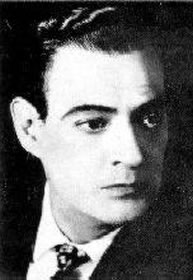
Salvador Novo (30 juli 1904 – 13 januari 1974)
De Engelse schrijfster Emily Brontë werd geboren in Thornton in Yorkshire op 30 juli 1818. Zie ook mijn blog van 30 juli 2006 en ook mijn blog van 30 juli 2007.
Often Rebuked
Often rebuked, yet always back returning
To those first feelings that were born with me,
And leaving busy chase of wealth and learning
For idle dreams of things which cannot be:
Today, I will not seek the shadowy region:
Its unsustaining vastness waxes drear;
And visions rising, legion after legion,
Bring the unreal world too strangely near.
I’ll walk, but not in old heroic traces,
And not in paths of high morality,
And not among the half-distinguished faces,
The clouded forms of long-past history.
I’ll walk where my own nature would be leading:
It vexes me to choose another guide;
Where the gray flocks in ferny glens are feeding;
Where the wild wind blows on the mountain-side.
What have those lonely mountains worth revealing?
More glory and more grief than I can tell:
The earth that wakes one human heart to feeling
Can centre both the worlds of Heaven and Hell.
Emily Brontë (30 juli 1818 – 19 december 1848)
Portret door haar broer Branwell Brontë
De Nederlandse publicist, journalist en politicus Jacques de Kadt werd geboren op 30 juli 1897 in Oss. Zie ook mijn blog van 30 juli 2007.
Uit: Hitler, of de triomf van het kazernisme
“Het Duitse nationaal-socialisme is ongetwijfeld een veel pathologischer product dan het Italiaanse fascisme. Bij de Italianen ziet men altijd de poging om tot een maatschappij hier op aarde te komen, een maatschappij met imperialistische soldaten-deugden en met een cultuur die een verheerlijking wil zijn van de imperialistische pralerij. Deze verlangens worden met grote hartstochtelijkheid naar voren gebracht, en die wilde hartstocht kan, bij oppervlakkige beschouwing, voor religie doorgaan. Maar wie het nader bekijkt, ziet hoe uiterst aards zowel de opzet als de exaltatie zijn.
Iets geheel anders bemerkt men bij het Duitse fascisme. Hier is niet de Italiaanse berekening, de geestdrift voor een rationele doelstelling en de opgewondenheid die uit een geestdriftige actie voortkomt, hier is de exaltatie het primaire, men beschouwt het aardse niet als de hoofdzaak, maar als een tussenstation om van buitenwereldse gevoelens tot nog meer geëxalteerde toestanden te komen.
Geen dwaling is groter dan het verwijt zo vaak tot de Nazi’s gericht, dat zij eigenlijk nieuwe ‘materialisten’ zijn, die een soort biologisch en geografisch materialisme van ‘ras, bloed en bodem’ in de plaats van de vroegere materialismen stellen. Zowel biologische als geografische argumenten hebben hun waarde, als ze tot een realiteits-systeem behoren. Maar reeds de gang van biologie-geografie naar ‘ras’, om niet te spreken van het zo mogelijk nog zottere ‘bloed’ en het zinledige ‘bodem’, is een gang van de realiteit naar de metaphysica. En de wijze waarop dan die metaphysica tot een te aanbidden mysterie gemaakt – men zou beter kunnen zeggen ‘geneveld’ – wordt, maakt het voor alle onderzoekers duidelijk, dat we hier met een typische ideologie te doen hebben en dan nog wel met het slechtste soort ideologie, nl. met een religie, die in staat van wording, in haar mythologische faze verkeert.”
Jacques de Kadt (30 juli 1897 – 16 april 1988)
De Schotse schrijver Alexander Trocchi werd geboren op 30 juli 1925 in Glasgow. Zie ook mijn blog van 30 juli 2007.
Uit: „To a fellow conspirator” – meeting Alex Trocchi (door Denis Browne)
„I realised my uncle was at my side, making a laboured intro about his nephew who’s interested in writing. Just as he was about to leave us, he turned to Alex, “Thanks, very — er, interesting — but I’m not really one for poetry” as he placed Man at Leisure on the table between us. As we discussed Cain’s Book, Alex realised that my appreciation of his work was more than literary. Soon I was swept away in a series of anecdotes of Sigma, smoking opium with Jean Cocteau in Paris, being on the run from the cops and the Mafia in the States, Michael X, the 60s scene, the proposed Invisible Insurrection. Everything had looked so hopeful, but then, as he put it “Everybody started dying.” This had a very personal significance to Alex and his immediate family, way beyond the lost Jimi and Janis icons, and was my first indication that experience had changed Alex from let’s-all-get-together 60s activism to a much more withdrawn, reflective and personal scene.
“So what are you working on now?” I asked innocently, after returning from the bar with more drinks. Alex shifted, slightly uncomfortably. “Och, various things”, before digressing into tales of rip-off US Mafia publishing pirates, wannabe Dutch film-makers and their inept Young Adam project. It was a tale I would become familiar with as the years went by with no new material.
Just as Alex was no longer the firebrand activist I’d expected, nor was he the voracious smack-fiend I’d been hoping for. He had his own secure personal scene, but kept it very discreet and cautious, for good reason, as I was to find out. He was sympathetic to my riches-to-rags junk story and the hassles of the lower end of the scene, but wary of involvement. Anyway, it turned out that Sunday was always Methadone Day.
“Sorry, I can’t turn you on today, old man. Why don’t you meet me here next week, and you can come back for a hit and I’ll show you some of my stuff.”
Great! I tried to sound cool as we prepared to leave the bar. As we left, Alex casually thrust the slim volume my uncle had rejected into my hand, “Eh, you might as well have this,” he said, casually, “Give me a call next week.”
We emerged on to a bleak and wet Kensington Church St and went in separate directions. As I waited for the bus on the High Street, I opened the book and read the dedication — “To Denis, a fellow-conspirator, from Alexander Trocchi.”
Alexander Trocchi (30 juli 1925 – 15 april 1984)
De Nederlandse schrijfster Pauline van der Lans werd geboren op 30 juli 1963 in Den Haag. In 2005 publiceerde ze haar debuutroman Van de wereld. Zij schrijft ook columns en artikelen voor de Nederlandse Federatie van Kankerpatiëntverenigingen en de gemeente Arnhem. En verder heeft ze losse verhalen gepubliceerd in bladen als Opzij en Margriet. In 2003 won ze de Margrietverhalenwedstrijd. Haar debuutroman gaat over een Nijmeegse arts, Albert van Rompaaij, die op non-actief wordt gesteld en daardoor de tijd krijgt om zijn leven te onderzoeken. De roman werd op 17 april 2005 feestelijk gepresenteerd in galerie Ruimte te Amsterdam.
Uit: Van de Wereld
“Ineens snapte hij alles en doorzag hij de gehele wereldproblematiek, van de lemmingenplaag in Noorwegen tot de Palestijnse vliegtuigkapingen. Het toilet stonk, het zeepje in de wastafel was verworden tot een grijze klodder en een handdoek was nergens te bekennen. Het kon hem niet deren. Niets kon hem deren. De gedempte cafégeluiden werden luider bij het openen van de deur. Jan-Willem wenkte hem en wees naar een vol beugelflesje op de bar. Ten teken van begrip en dank knikte Albert hem toe. Om hem heen stonden mensen naar elkaar toegebogen te praten. De harde muziek maakte een normale conversatie onmogelijk. “In the summertime when the weather is high, you can fresh right up and touch the sky”. Overmeesterd door een blije dronkenschap overzag Albert het rumoer. Ondanks de rook en de zweterige atmosfeer drong haar musk zich op. Het mooiste meisje van de wereld. Ze lachte naar hem. Lang donker haar met een middenscheiding, zwart omlijnde ogen, een bloemetje geschilderd tussen haar wenkbrauwen. Haar huid was door de zon gebruind, haar lippen uitnodigend, haar borsten vol. Ze had een lange bordeauxrode jurk aan, overdekt met lovertjes. Om haar hals een ketting met zijn sterrenbeeld.
Ze zaten samen aan de Waal, het water klotste tegen de kant. Een verdwaalde hond snuffelde aan haar blote tenen, ze giechelde, de hond rende weg op het horen van een fluitje. Haar haar rook naar shampoo en rook, haar lippen smaakten naar chocola. Ze lachte naar hem. Vijftig meter verderop legde een plezierjacht aan, gejoel klonk over de kade. Toen ze uren later in zijn bed in slaap was gevallen, stapte hij voorzichtig over haar heen, nam een glas water en zette zachtjes een plaat op. Hij nestelde zich in zijn clubfauteuil en vol ontroering bezag hij de vage lijnen van geschilderde bloemen op haar borsten. Een startende auto gaf aan dat voor sommigen de werkdag weer begon. Een tweede auto hoorde hij al niet meer. Met een glimlach rond zijn lippen viel hij in slaap. ‘Lay lady lay, lay across my big brass bed.’
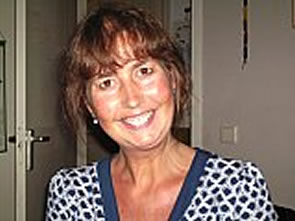
Pauline van der Lans (Den Haag, 30 juli 1963)










